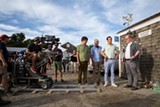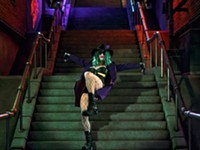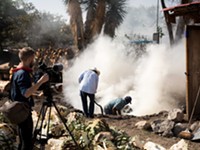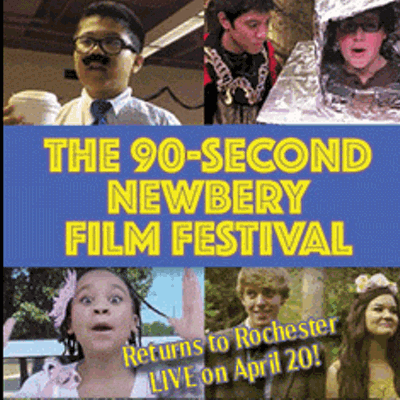Interview: Director John Curran on finessing the right tone
[
{
"name": "500x250 Ad",
"insertPoint": "5",
"component": "15667920",
"parentWrapperClass": "",
"requiredCountToDisplay": "1"
}
]
Director and Pittsford resident John Curran ("The Painted Veil") brings a welcome intelligence to his political docu-drama "Chappaquiddick," which details the infamous July 1969 incident in which Senator Ted Kennedy (played by Jason Clarke in the film) drove his car off a bridge and into a pond following a party in Martha's Vineyard. The tragic accident resulted in the death of 28-year-old campaign strategist Mary Jo Kopechne (Kate Mara), while Kennedy himself walked away unscathed and with only the slightest impact on his political career. The film is an often damning examination into the corrosive power of privilege and celebrity, but one that manages to find a modicum of empathy for those on either side of the scandal.
Ahead of its local premiere this Friday, CITY spoke with Curran by phone about the delicacy required to bring such a potentially divisive story to the screen, as well as the challenges of maintaining a filmmaking career in Hollywood while living right here in Rochester.
CITY Newspaper: How did you get involved in "Chappaquiddick," and what originally attracted you to this story?
John Curran: I originally got the script from Jason Clarke's manager. I've worked with him before on another film. I used to live in Australia for like 15 years and started my film career there. And Jason was actually in my first film. I wanted to work with Jason again for a while, so that was part of it. I knew it was about Chappaquiddick and to be honest, I was worried it was gonna be a one dimensional hit piece, but the script really blew me away. It was a much more nuanced, compelling portrait of Ted at this time in his life and during the incident. And it also created a fully dimensional character out of Mary Jo, who had kind of been shafted by history to being kind of a background floozy.
And I'm a fan of Teddy Kennedy. I mean, the whole creative team on this, we're all kind of left-leaning Democrats. But I read it in 2016 around the time of the primary season, when I was calling out a lot of hypocrisy on the other side of the aisle. But I recognized that I've always had sort of a blind spot about Teddy and this chapter in his life. And it just felt like the right time to try and take an honest look at these people who we support and repeatedly voted into office.
The film's depiction of events feels incredibly authentic. What kind of research was done by screenwriters Taylor Allen and Andrew Logan during the scripting stages?
They got the complete transcript of the inquest that was held about a month and a half after Teddy went on TV and gave his speech. Taylor and Andrew wanted to stick as close to the facts as we know them. Obviously there's invented dialogue and hybrid characters, and whatnot. But mostly they drew from the inquest itself.
There are any number of ways this material could have been played; in a sensationalized, "ripped from the tabloids" way, as a satire, or a procedural. How did you go about finding the right tone for the story?
What struck me most about the script was my reaction to it as I was reading it. And how it begins as this sort of tragedy, then evolves into almost a farce. I found myself feeling for Ted, then I was sort of disgusted that I was feeling for him. Then I was laughing at scenes, and being disgusted that I was laughing. That sort of visceral response and the shifting allegiances that I experienced, I wanted to capture in the film. And it was hard because I really struggled to get a very non-partisan, balanced tone overall to the thing. But playing with pathos and comedy doesn't always work, so the finessing of that really came about in the edit. Taking things out, putting other things back in, because in some of the early edits it was tipping too hard into one direction or the other.
It's funny you mention the comedic element, because that's something that stuck out to me. The casting of Ed Helms [playing Teddy's loyal cousin and lawyer Joe Gargan] and Jim Gaffigan [as Massachusetts attorney Paul Markham] underlines that in a lot of ways. They're not necessarily playing for laughs, but their incredulous reactions reflect how the audience feels as well. What was your direction like for the actors during those scenes?
For those parts, I definitely wanted to cast some guys that brought that right kind of humor with them. When Ed Helms and Jim Gaffigan come on screen, you tend to be open to them doing something funny, even when they're not. Probably because of how you know them, and how you're informed by their careers.
But what's great about those guys is that comedians just know instinctively more than actors about how to use a deadpan look or pause. They've got that comic timing even if they're doing drama. Ed and Jim are really smart guys and I knew from meeting them that you would believe them as highly educated lawyers, so they had that. I've found in working with comedians on other things, that they're great dramatic actors below the surface. They just don't get those chances very often.
Jason Clarke's performance plays such a big part in how we view Ted throughout the film. We feel a bit of empathy for him, even as we're horrified by his decisions. What can you tell me about the casting process for that role, finding someone who could play his contradictions?
Jason was already attached to [the script] when it came to me. And I could see it: you put his face up against Ted's, and he has similar bone structure. And I knew that with the right hair -- and then we made him a set of teeth, because Teddy's got such recognizable chompers, and I felt that he could physically embody it. Jason's a great actor, and knowing him already, I knew that he had all those extremes in him. That he could be very empathetic, but he could also be funny.
Jason also didn't want to pull any punches, so I knew that he would go at it and give a warts-and-all performance. During filming, we tended to bracket scenes. We did them the way our instincts said to do them, then we'd try extremes of going either way over-the-top or pulling it way back. So in the edit, I had options and could kind of craft the right moment. Because sometimes when you're on set, what seems right on that day -- then you get in the edit room and wish you'd done that one take that was a little bit different. We were really careful going through it to make sure we had extremes in his performance so we could tap into that in the edit.
You'd mentioned he was already signed on when you became involved. Was it was a written with him in mind?
No, but he really chased it aggressively. The process of casting, there's always about five people that everybody wants in their film because it guarantees you the most amount of money for your budget. Actors have worth attached to them. And before I came on board there were a few other actors that were considering it. But Jason was there from the beginning. When he read it, he wanted it and he felt he should do it. Then he got it, and really it made its way to me because of him.
We see the accident itself from different viewpoints throughout the film. What were some of the challenges in shooting that sequence?
Well, I wanted to shoot on Chappaquiddick. The bridge is still there, but we had visual effects to alter it a bit because the bridge looks different now. It's got guardrails on it and some other stuff to make it look like it did back then. I knew we wouldn't be able to work totally on Chappaquiddick, but I didn't want to just find some other pond or some other bridge. So we built the bridge to the original specs, completely to scale in a water tank in Mexico where they filmed "Titanic." In fact, I think the facility was built for "Titanic." So we did all the bridge accident and underwater scenes down there in a water tank. The accident was very specific, so I thought the hardest thing was going to be getting that right. The car went off and did like a half roll and landed perpendicular to the bridge on its roof. But I had this amazing stunt guy who rigged up the car on a pulley system, and he did that accident in one take. It literally went off the bridge, flipped, and landed absolutely perfectly. So what I thought was going to be something I'd have to fix in post with computer effects or something, He nailed it in one. That was a big relief.
And what about the sequences with Kate Mara in the car after it's underwater?
That was in a smaller tank in the same facility, and it was more controlled. But it was still very harrowing for her, I'm sure. I don't know how comfortable she was, because she's gotta swim down and get in there and then she's trapped inside with just a cameraman. It was one of the last days of shooting and there was a lot of pressure again because you're running out of time, and you're trying to get stuff done. That was probably the most difficult stuff to shoot for all of us. Definitely for her -- it wasn't a lot of fun.
With the nature of this story, people are bound to come in with certain expectations, depending on their own political viewpoints. And a lot of them may have already decided what they expect from this story on screen. Was that on your mind at all as audiences started to see the film?
It's a constantly evolving truth. Like a lot scandals, I've read a lot of dumb conspiracy theories. But people are probably going to leave with a lot more questions than answers, and that was the point, you know? People are going to see it through the prism of their political allegiance so to speak. Someone that hates Ted is probably going to be validated by the film, and someone that admires him might now have a more complicated portrait that they have to consider. But in the end, I think the one thing that should unite all people -- left and right of the aisle -- is that we should all be taking a harder look at the people we support. And not putting up with crimes from [our politicians] that we would go to jail for. We certainly shouldn't give them a pass just because we've elected them into office. I hope that resonates, obviously considering the president that we have today.
There's an idea that in order to have a successful career as a filmmaker, you need to be located in LA or New York City. But you've managed it while living in Pittsford. How much of a challenge has that been over the years?
Well, I did my time in L.A. From Australia, I moved to L.A. and I was there for six years or something like that. It's tough to break into the film market anyway, regardless of where you're living. And I wouldn't have come from Australia right back to Rochester. The reality of my job is that when I'm working, I'm somewhere else.
I was going off to China for a year and a half to do a film, and my wife and I had just had a kid in Australia. My wife is from Rochester as well and she's like, "well while you're in China, I'm going to go back home and spend a year there." That one year turned into all his entire time through school -- he's in college now and about to graduate. So I spend more time now in L.A. since I've got to keep one foot there. I'll hopefully be dual coast soon, where I'll have a place there and go out for months at a time, but then come back here whenever I can.
"Chappaquiddick" opens on Friday, April 6.








